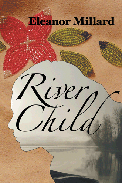"I am eighteen, an illegitimate Indian kid, living in a puny old log cabin with my grandfather. And who are you? You’re a Whiteman, you’ve been to university, you're a social worker, nearly ten years older than me..."

 |
River Child by Eleanor Millard Trafford Publishing
book review by Caroline Blaha-Black
The words above echo the feelings of Selena Maclean, an Indian woman, who was born in Yukon's Klondike, famous for its Gold Rush. River Child is mostly Selena's story, and her life in the small city of Dawson, but it is also a story of her mother, Eliza Maclean, and Selena's grandfather, Dave Maclean, a white man, who has been taking care of Selena since her youth.
The first part of the story chronicles Eliza Maclean's life, from her beginnings as a young student in the Indian school to which her father sent her to study for several years, to the sexual abuse she suffered there, and her descent into alcoholism and destructive behavior after she returned home. Her daughter Selena, who was raised by her grandfather, hates her mother for her neglectful behavior, and she tries to stay out of trouble in an Indian community where drunkenness is a way of life. Selena tries to fit into a society where Whites and Indians live side by side, but do not mingle, and encounters personal and social conflicts in Dawson.
The book is in part a tragic tear-jerker, but readers find themselves cheering for Selena throughout the book, as she goes through her trials and tribulations. She has feelings for Michael Scott, a white, educated social worker in Dawson. When the Dawsonites find out he’s dating an Indian girl, they try to break them up, and finally, Michael loses his job and is forced to break up with Selena. The breakup and the death of her beloved Indian grandmother makes Selena descend into the same personal hell her mother experienced with drugs, men, and drinking.
Millard has expertly described, in an emotionally-charged, engaging prose, the strained relationships between the white people and the Indians in Dawson, and the racism that lies just underneath the surface of an otherwise quiet town, where everybody knows what everybody else is doing. This is a good, engrossing book, based on Millard's personal experiences, who has lived in the Yukon since 1965.